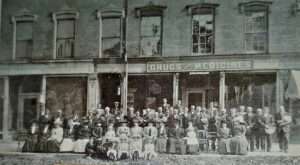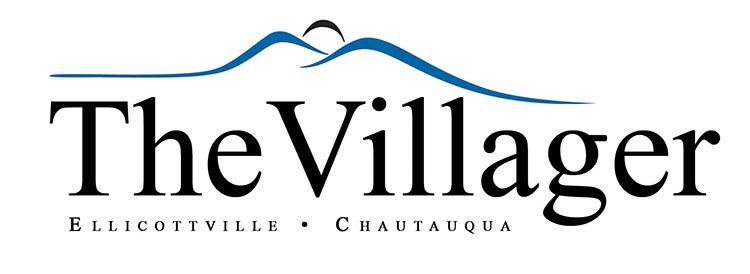Carol Fisher-Linn
Buildings tell stories, and these walls are talking…

Every new community that sprang up in the new world seemed to center around a church and public buildings. But there were other businesses that a village/town couldn’t do without. I speak here of drug stores. Let’s travel back in time when two-thirds of Americans lived on farms or in rural villages. Think about this – Ellicottville is all about skiing but the skiing all started on hilly farmland. The Dineen, Murphy, and Fox families all probably thought they were dreaming when offered good money for their rocky farmland. If the land wasn’t being farmed, it was filled with fruit tree orchards. Did these early settlers have indoor plumbing? Nope. Electricity? It was 1896 when the first AC powerline was activated, transmitting power from Niagara Falls to Buffalo, NY. Ellicottville was settled in 1817. They had kerosene lamps. Roads? Well, they had the old Chautauqua Road from Franklinville over Bryant Hill, through what is now Washington Street then up Fish Hill toward Mayville. When it was first cleared in the 1820’s it was initially only wide enough for one person on a horse. They had plank roads to ease passage through otherwise muddy trails. Furnaces? They heated themselves three times with each piece of wood they brought into the home for the sooty wood burning stoves – once when the tree was cut, once when it was dragged from the source into the home and finally, once when it was set afire in the trusty old wood stove.
Work was difficult in those early days as the settlers built our growing community, one felled tree at a time. Accidents were very common. The country doctor was left to do everything from delivering babies, mending broken bones, and treating serious diseases. TB, cholera, typhoid, malaria, and diphtheria were all fairly common. Their classic black doctor’s bag may have carried various bloodletting tools (commonly believed to cure many ills) but vaccines were rare. Today lab tests are matter of course. Those days they simply were not available. Country docs even had to do surgeries in the home if a patient could not get to a city hospital. As it happens today on the internet, the good folk back then fell prey to the flimflam medicine salesmen who sold magical elixirs that cured everything from snake bites to rheumatism. Without many medicines, the docs often had to let their patients use these phony medicines and gave prescriptions for rest, broth, gruel, or hot drinks. Most medicines were applied topically or dissolved in liquids. The doctors themselves prepared these medicines until pharmacies became more prevalent. Oh, yes, and opium was ubiquitous, used for diarrhea and other ills. Recreational smokers sought opium for euphoria and relaxation, while parents soothed restless and teething babies with opiate-laced syrups. Health care was wild in those early days.
Thankfully, in 1852, a man named Elihu S. Stewart built his share of the Brick Block (the middle one) specifically to house a drug store. It remained thus throughout the building ownership going through various hands – in 1871 it was leased by Seth and Truman Hinman, In 1876, Thomas Aldrich and Francis Hinman took the building over. Herman Drown bought it in 1883, followed by Paul H. Drown purchasing it in 1907. In 1908, Dr. Albert Smallman purchased the building and operated the store until 1929, keeping his medical offices in the back, when Ward Winship took over the operation. In 1932 he was joined by Lewis Winship, and in 1941 Graham Smith leased the building and ran the pharmacy until 1969. This was when Bill and Marge Little, pharmacists from Springville, bought the building calling it the “Little Pharmacy.” It closed in 1971 but it continued to fill drop-off prescriptions in this location now called the Holiday Shoppe – no pharmacy existed in that shop. In 1979 Steve Ward joined the Littles and re-opened Ellicottville Pharmacy and in 1980, Steve became sole owner. In 1985 Woody Klein became Steve’s partner and in 2006 the pharmacy moved to its new location on Route 219. In 2000 Brigid Ward ran the new Holiday Shoppe, no longer a pharmacy but a lovely store filled with gifts and cards. Dina DiPasquale then purchased that middle of the Brick Block and expanded her restaurant, Dina’s into that space, offering up a different kind of “medicine” to her clientele.
